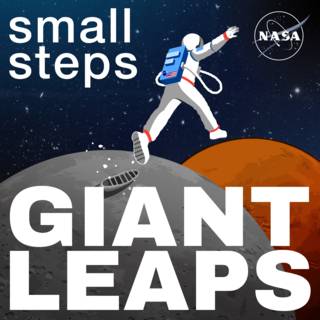Discover Small Steps, Giant Leaps
Small Steps, Giant Leaps

Small Steps, Giant Leaps
Author: National Aeronautics and Space Administration (NASA)
Subscribed: 333Played: 6,039Subscribe
Share
© NASA/APPEL Knowledge Services
Description
NASA’s technical workforce put boots on the Moon, tire tracks on Mars, and the first reusable spacecraft in orbit around the Earth. Learn what’s next as they build missions that redefine the future with amazing discoveries and remarkable innovations.
135 Episodes
Reverse
The Internet of Animals, a collaborative research project with the U.S. Geological Survey along with several universities and institutions is giving insight into the intersection of animal movement patterns and climate. By combining remote sensing data with wildlife tracking tags, experts can get a better idea of scientific needs to manage conservation at the federal level.
In this episode, Dr. Gioia Massa, senior Life Sciences project scientist at NASA’s Kennedy Space Center, outlines the systems and processes used for growing vegetables aboard the International Space Station. The technology could one day support astronauts on long-duration missions in deep space. What we learn can benefit agriculture on Earth as well.
A new NASA report titled "Cost and Benefit Analysis of Mitigating, Tracking, and Remediating Orbital Debris" compares the cost-effectiveness of several strategies that could reduce the risk of collisions between spacecraft, including the space station, and orbital debris.
In this episode, Jacob Bleacher, NASA’s chief exploration scientist, tells us about the science goals of the Artemis Lunar Terrain Vehicle and how NASA is collaborating with industry to explore more of the Moon’s surface than ever before.
Teddy Tzanetos shares his project management experiences and lessons learned from leading the Ingenuity Mars Helicopter demonstration mission, the first test of powered, controlled flight on another world.
In this episode, Dr. Chelle Gentemann, Open Science Program Scientist for the Office of the Chief Science Data Officer, explains NASA’s initiative to make science more collaborative, accessible, and inclusive. Known as Transform to Open Science, or TOPS, the program encourages increased access to research and data.
How inflatable habitats moved from concept papers to the International Space Station, and what NASA is doing to eventually put one on the Moon.
Dave Mitchell brings extensive experience as an engineer and project manager to a new position leading a small team with the broad mandate of improving acquisitions and program and project management across NASA.
In this episode we’ll focus on Gateway, a small space station NASA is developing to place in orbit at the Moon. We’ll speak with Mark Wiese, who leads the team that will ensure Gateway will receive the cargo, equipment, and supplies it needs to support Artemis astronauts.
Janet Karika, who retired recently from NASA after 43 years in the aerospace industry, shares career highlights and her approach to leading the Artemis I Lessons Learned process.
Dive deep into the world of in-space manufacturing (ISM) with our guest, Zach Courtright, the In-Space Manufacturing Portfolio Manager at NASA. Zach shares his perspectives on cutting-edge advancements and collaborations in the field and the potential of the technology for game-changing impacts on space exploration and resource utilization.
Today, we look at NASA’s PACE mission, which seeks to unravel some of the mysteries of Earth’s atmosphere and the vital role played by aerosols and clouds. Join us as we delve into this fascinating journey with atmospheric scientist Dr. Kirk Knobelspiesse.
In this episode, we step behind the scenes of NASA's Orion project to explore the remarkable teamwork, leadership, and communication that drive this groundbreaking endeavor. Join us as we sit down with Stu McClung, the NASA Orion Test lead, to talk about the Orion mission and the human side of space exploration.
In this episode, we chat with Dr. Zach Pirtle, a policy analyst for NASA’s Office of Technology, Policy and Strategy about NASA’s Artemis and Ethics workshop, which explored the ethical, legal, and societal implications of its Artemis and Moon to Mars missions.
In this episode, we sit down with Jim Rostohar, Chief Knowledge Officer for NASA's Johnson Space Center, to explore the vital role of knowledge sharing within the organization.
Rocket Propulsion Test Program Manager Christine Powell discusses chemical propulsion testing at NASA’s world-class facilities.
NASA SpaceTech's Michael LaPointe and John Nelson discuss the Center Innovation Fund and Early Career Initiative.
NASA Marshall Space Flight Center Engineering Technicians John Hood, Amy Meekham, and Mark Sloan discuss details of their work on the Imaging X-ray Polarimetry Explorer.
NASA Technicians Scott Bartram, Eric Bentley, Maria Salinas, and Phil Steele discuss their hands-on work on a variety of projects and technologies.
NASA Armstrong Flight Research Center Engineering Technicians Jason Nelson, Kyle Whitfield, and Alex Zamora discuss their essential contributions to NASA missions.
Comments
 United States
United States






